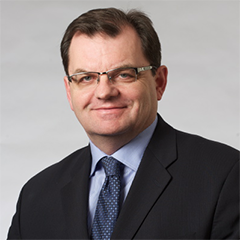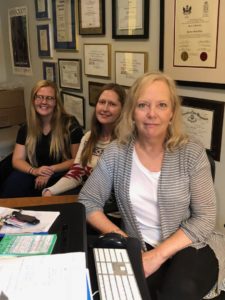Recently, I received this note from a King’s parent:
“Our family welcomed our daughter back from her FYP experience a month ago. She is hale and hearty, and perhaps even more importantly, she is full to the brim with a new confidence and fresh insights into literature, history, and current events. Despite a fall hurricane, a winter blizzard, and a spring plague, she has had an excellent year. We sincerely hope she will be joining her FYP friends again in September.
In the meantime, a sincere thank you to all the excellent professors and staff at Kings. Your devotion and care of your students is clear, and deeply appreciated.”
 It fills my heart with joy to receive such a note at the end of such a year. Its heartfelt message also inspires confidence and optimism for the year ahead. FYP—and King’s more generally—is all about giving our students “new confidence and fresh insights.” It is all about friendship. It is made possible by “excellent professors and staff,” and equally by extraordinary students, and by “devotion and care” in all directions. These are the building blocks that make our community, our Collegium Regale, so strong and so beautiful. They ready us for all challenges, including a pandemic and the reimagining of FYP and all our programs in a future that will likely blend online and in-person teaching and learning in ways that will keep everyone safe while expanding the horizons of our academic mission.
It fills my heart with joy to receive such a note at the end of such a year. Its heartfelt message also inspires confidence and optimism for the year ahead. FYP—and King’s more generally—is all about giving our students “new confidence and fresh insights.” It is all about friendship. It is made possible by “excellent professors and staff,” and equally by extraordinary students, and by “devotion and care” in all directions. These are the building blocks that make our community, our Collegium Regale, so strong and so beautiful. They ready us for all challenges, including a pandemic and the reimagining of FYP and all our programs in a future that will likely blend online and in-person teaching and learning in ways that will keep everyone safe while expanding the horizons of our academic mission.
This reimagining is happening in all of our academic programs, as we prepare for all scenarios and options, under the guiding hand of Vice-President Peter O’Brien. I thank Dr. O’Brien, our faculty, program directors and governing bodies, for the work they are doing and for the collegiality with which they are carrying it out. I am also pleased we are able, including because of alumni generosity, to hire students to help with this work, both for the opportunity it will provide to students and because it will ensure the lived experience of our students is embedded in how we integrate online teaching and learning into our academic mission.
The preparations underway in FYP, for example, are inspirational. FYP excels at what any first year of university should do, which is to prepare students for an exceptional education in the rest of their degrees and beyond. As Dr. Susan Dodd and her FYP colleagues have recently summed it up, “You really can’t get a better start to an undergraduate degree and you only have to ask anyone who has been through FYP to know why.”
The truth of this will be accentuated and not reduced in the coming year. In a year in which first-year students may be physically apart from one another, FYP would, as it always does, pull them into a community of scholars at the beginning of their higher education. Uniquely in FYP, our first-year students would unite across time zones and jurisdictions by the common experience of giving care and attention to the same important books from across the ages and intellectual traditions on the same seasonal schedule. In groups roughly half their already-small size, our students would gather regularly in virtual tutorials to discuss those books and the questions they prompt, including questions that go to the heart of the uncertainty, worry and loneliness that can weigh heavily on our students, and us all, at this moment in history. These tutorials would ensure the FYP experience continues to be defined by our tutors’ care and attention to the complex and personalized needs each student has in following the ambitious FYP curriculum. And as it always does, FYP will once again give structure and rhythm to the student experience during the critical transition from high school to university, while immersing our students in a curated, cohesive and interdisciplinary curriculum. In all of these and in other ways, however it is delivered, FYP will again give next year’s incoming students “a new confidence and fresh insights into literature, history, and current events,” when that is perhaps more important than ever.
Meanwhile, we are working on plans and measures to allow a gradual and responsible physical reopening of campus when this becomes possible under prevailing public health conditions and directives. In doing so, our first priority will be the safety of those who would, for compelling reasons, then be working on campus on a limited basis with protective measures in place for their safety and that of their families and the broader community. This will be the first stage of a larger plan to welcome students back to campus under conditions that will similarly protect their health and safety, when that becomes possible.

Pauline Dakin with Lyndsay Armstrong and Megan O’Toole.
This week we received uplifting news that the Institute for Investigative Journalism, which included King’s students Megan O’Toole, MJ’19 and Lyndsay Armstrong, MJ’19 and their advisor Professor Pauline Dakin, MFA’15, has been nominated for the Michener Award for public service journalism for their stories on “Tainted Water” concerning municipal drinking supplies across Canada. The Michener is Canada’s premiere journalism award and this is the first time a collaborative journalism network, a new approach to journalism, has been nominated. Municipalities across Canada have responded to the group’s investigative work by implementing or promising improvements to the safety of our drinking water. It is yet another example of how our body politic needs student journalists and journalism schools and of how the great work of our journalism students is not only great student journalism but great journalism, period.
And it doesn’t stop there. Today it was announced that students, alumni and faculty of King’s Journalism School received notable honours at the Atlantic Journalism Awards. This includes a King’s sweep in the student journalism category: gold for Professor Fred Vallance-Jones and his students for Foreclosed; silver for Professor Fred Vallance-Jones and his students for Standing Still; and silver to Olivia Blackmore, MJ’19, for Searching for the meaning of ‘moderate livelihood’, all of which were published by The Signal. Professor Stephen Kimber also was awarded gold and silver awards, and more than 10 of our journalism alumni were honoured. The Enterprising Reporting award went to a team mentioned earlier for the reporting work they did on “Tainted Water,” including alumni Zane Woodford, BJ(Hons)’13, and Robert Cribb, BA(Hons)’89 who were also part of the “Tainted Water” team.
The new Bookmobile business modelhttps://t.co/ZkmfmqfYLN pic.twitter.com/377CLME0Xm
— King’s Co-op Bookstore (@kingsbookstore) March 21, 2020
Before I close, I note inspiration of a different kind. Paul Mackay, who manages our community owned bookstore, continues his bicycle delivery within Halifax while members of the co-op’s board handle deliveries to Dartmouth and beyond. Each day when I collect my mail in the A&A, I see freshly addressed packages of books piled up, heading to all parts of the country. My admiration and thanks to Paul and the bookstore’s volunteer leadership, for their frontline perseverance on behalf of readers. You can by the way, place your own orders at King’s Co-op Bookstore.
As always, I end by offering a recorded lecture from the delightful vault of Halifax Humanities, courtesy of Dr. Neil Robertson, Dr. Susan Dodd and Dr. Dawn Brandes. This week we offer Dr. Angus Johnston on Conscience and Persuasion…. Enjoy!
Best regards,
Bill

